|
|
|
Sort Order |
|
|
|
Items / Page
|
|
|
|
|
|
|
| Srl | Item |
| 1 |
ID:
151000
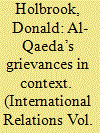

|
|
|
|
|
| Summary/Abstract |
At a time when political debate in the West is preoccupied with the perceived impact of extremist ideas on individuals who embrace or support terrorism, this article uses the publicly articulated grievances of Ayman al-Zawahiri, Al-Qaeda’s most prolific ideologue, as a case study to examine how a globally focused and distributed extremist narrative matches political realities on the ground. The approach of the article is to compare two political processes: the approach of Islamist extremists, as represented by Zawahiri, to constitutional reform as articulated through public appeals to potential supporters versus the reality of constitutional amendments and evolution of fundamental law in the Middle East and South Asia. Incorporating insights from studies on law and society and International Relations, the article demonstrates how Zawahiri’s interpretation of religious law emphasises wholesale adoption of sharia while the process of legal reform has invariably resulted in the creation of legal hybrids, mixing Islamic and non-Islamic legal traditions. This is not an article about theology or religious law but an effort to dissect the public relations of an international terrorist movement. The analysis pays particular attention to events in Zawahiri’s native Egypt, where evolving grievances concerning a series of constitutional amendments – including those following the Arab revolutions and the toppling of Mohammed Morsi – are assessed.
|
|
|
|
|
|
|
|
|
|
|
|
|
|
|
|
| 2 |
ID:
104695


|
|
|
| 3 |
ID:
023945


|
|
|
|
|
| Publication |
London, Hutchinson Educational Ltd., 1970.
|
| Description |
xi, 377p.
|
|
|
|
|
|
|
|
|
|
|
|
Copies: C:1/I:0,R:0,Q:0
Circulation
| Accession# | Call# | Current Location | Status | Policy | Location |
| 007393 | 320.3/PRI 007393 | Main | On Shelf | General | |
|
|
|
|
| 4 |
ID:
145908
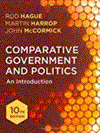

|
|
|
|
|
| Edition |
10th ed.
|
| Publication |
London, Palgrave, 2016.
|
| Description |
xv, 366p.pbk
|
| Standard Number |
9781137528360
|
|
|
|
|
|
|
|
|
|
|
|
Copies: C:1/I:0,R:0,Q:0
Circulation
| Accession# | Call# | Current Location | Status | Policy | Location |
| 058716 | 320.3/HAG 058716 | Main | On Shelf | General | |
|
|
|
|
| 5 |
ID:
073206
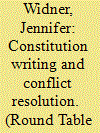

|
|
|
| 6 |
ID:
129641
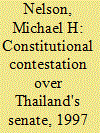

|
|
|
|
|
| Publication |
2014.
|
| Summary/Abstract |
One key component of modern constitutions is the representative system. The often-contested codification of this system over time in democratizing political orders depends on a number of factors, such as the existing institutional setting, the power relations of important political actors, and the ideational resources, or political culture, available to the constitution drafters. This article examines the ideational resources drawn on by the members of Thailand's 2007 Constitution Drafting Committee (CDC) in debating and deciding the shape of the National Assembly's upper house, the Senate. This is mainly done by analysing the word-by-word minutes of the meetings. The respective processes of the 1997 CDC are described more briefly in order to provide background on an area of constitutional contestation that found its latest expression in November 2013, when the Constitutional Court invalidated the National Assembly's constitutional amendment, which would have reintroduced a fully elected Senate. The article contextualizes these developments by reference to mass protests against the "Thaksin regime" that had been organized since November 2013 by the so-called People's Democratic Reform Council (PDRC).
|
|
|
|
|
|
|
|
|
|
|
|
|
|
|
|
| 7 |
ID:
169262
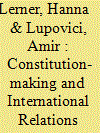

|
|
|
|
|
| Summary/Abstract |
Constitution-making has become an intrinsic component of international politics, nevertheless, international relations scholars largely refrain from theorizing it tending to view formal constitutional drafting as a domestic project. The article proposes an understanding of constitution-making as an international (in addition to national) political phenomenon. We develop a new and comprehensive classification of international influences on constitution-making. We also demonstrate how the empirical study of constitution-making can illuminate overlooked areas of research and challenge existing international relations theories. Our focus here is on the study of international norms. We present three theoretical insights concerning the emergence of international norms, their dissemination, and the role of epistemic communities in facilitating their expansion. We conclude by highlighting how the interaction between international and domestic factors in the crafting of constitutions further challenges the disciplinary distinction between domestic and international politics.
|
|
|
|
|
|
|
|
|
|
|
|
|
|
|
|
| 8 |
ID:
095086
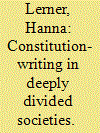

|
|
|
|
|
| Publication |
2010.
|
| Summary/Abstract |
The article addresses the puzzle of how societies still grappling over the common values and shared vision of their state draft a democratic constitution. It argues that an incrementalist approach to constitution-making enabled such deeply divided societies to enact either a written constitution or function with a material constitution by deferring controversial choices regarding the foundational aspects of the polity to future political institutions. It demonstrates how various types of incrementalist constitutional strategies - such as avoidance of clear decisions, the use of ambivalent and vague legal language, or the inclusion of contrasting provisions in the constitution - were deployed in the constitutional drafting of three deeply divided societies: India, Ireland and Israel. By importing the existing ideational conflicts into their constitutions, and by deviating from the common perception of constitution-making as a revolutionary moment, the framers in these three cases enabled their constitutions to reflect the divided identity of 'the people'.
|
|
|
|
|
|
|
|
|
|
|
|
|
|
|
|
| 9 |
ID:
098350
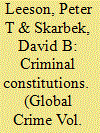

|
|
|
|
|
| Publication |
2010.
|
| Summary/Abstract |
Why do criminals use constitutions? This article argues that constitutions perform three functions in criminal organisations. First, criminal constitutions promote consensus by creating common knowledge among criminals about what the organisation expects of them and what they can expect of the organisation's other members. Second, criminal constitutions regulate behaviours that are privately beneficially to individual criminals but costly to their organisation as a whole. Third, criminal constitutions generate information about member misconduct and coordinate the enforcement of rules that prohibit such behaviour. By performing these functions, constitutions facilitate criminal cooperation and enhance criminals' profit. To examine our hypothesis we examine the constitutions of two criminal organisations: eighteenth-century Caribbean pirates and the contemporary Californian prison gang, La Nuestra Familia.
|
|
|
|
|
|
|
|
|
|
|
|
|
|
|
|
| 10 |
ID:
129643
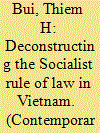

|
|
|
|
|
| Publication |
2014.
|
| Summary/Abstract |
Over the past two decades, efforts by the Communist Party of Vietnam (CPV) to build a "socialist" rule of law through legal and judicial reforms have contributed to the vibrant constitutional politics in the country. During the process of amending the 1992 Constitution, the socialist theoretical foundations of the Constitution quietly shifted as a result of new thinking and values. The complex interactions of old and new ideological precepts were prominently reflected by the changing discourse of human rights during debates about amendments to the 1992 Constitution. This article investigates the development of the "socialist" rule of law and the changes taking place in the discourse of human rights during the constitutional reform process in Vietnam. In setting out the context and content of constitutional reform, it seeks to deconstruct the socialist rule of law and interpret the discourse of human rights accordingly. In doing so, the mechanisms by which human rights have been socialized will be unpacked to make sense of subtle changes in the human rights discourse. Furthermore, the paper aims to uncover the implications of such a change for the development of Vietnam's human rights regime.
|
|
|
|
|
|
|
|
|
|
|
|
|
|
|
|
| 11 |
ID:
144258
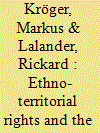

|
|
|
|
|
| Summary/Abstract |
In recent times a growing number of Latin American rural groups have achieved extended ethno-territorial rights, and large territories have been protected by progressive constitutions. These were the outcomes of extended cycles of national and transnational contentious politics and of social movement struggle, including collective South–South cooperation. However, the continent has simultaneously experienced a resource extraction boom. Frequently the extractivism takes place in protected areas and/or Indigenous territories. Consequently economic interests collide with the protection and recognition of constitutional rights. Through a review of selected demonstrative cases across Latin America, this article analyses the (de jure) rights on paper versus the (de facto) rights in practice.
|
|
|
|
|
|
|
|
|
|
|
|
|
|
|
|
| 12 |
ID:
186731
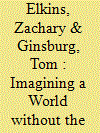

|
|
|
|
|
| Summary/Abstract |
The Universal Declaration of Human Rights (UDHR) is thought to have shaped constitutions profoundly since its adoption in 1948. The authors identify two empirical implications that should follow from such influence. First, UDHR content should be reflected in subsequent national constitutions. Second, such reflections should bear the particular marks of the UDHR itself, not those of the postwar zeitgeist more broadly. The authors examine the historical evidence at various levels to identify and untangle the UDHR's impact. In a macro analysis, they leverage an original data set on the content of constitutions since 1789. They explore historical patterns in the creation and spread of rights, and test whether 1948 exhibits a noticeable disruption in rights provision. The authors build a multivariate model that predicts rights provision with constitution- and rights-level covariates. To gain further analytic leverage, they unearth the process that produced the UDHR and identify plausible alternative formulations evident in a set of discarded proposals. The authors further test the plausibility of UDHR influence by searching for direct references to the document in subsequent constitutional texts and constitutional proceedings. The evidence suggests that the UDHR significantly accelerated the adoption of a particular set of constitutional rights.
|
|
|
|
|
|
|
|
|
|
|
|
|
|
|
|
| 13 |
ID:
176046


|
|
|
|
|
| Summary/Abstract |
Effectively measuring variation in institutions over time and across jurisdictions is important for examining how institutional characteristics shape political, social, and economic issues. We present a new dataset of American Indian and Alaska Native (AIAN) constitutions and a new approach for measuring variation in polities using machine learning techniques. Existing data on AIAN institutions have largely been based on costly and time-consuming expert coding and survey approaches, where the end product will become obsolete once institutions change. Our automated content analysis of AIAN constitutional documents allows for more flexible and customizable measurement of the variation, using a larger corpus of data than existing approaches, limited by data collection and coding costs. We consider variation in judicial institutions, previously shown to play a crucial role in AIAN development, and compare our machine coded measures to existing hand coded data for a sample of 97 American Indian constitutions. We show that machine coding replicates expert coded data. Our approach can be easily extended to other topics, including the executive, and shows the potential of automated measures to complement or confirm traditional coding of political institutions.
|
|
|
|
|
|
|
|
|
|
|
|
|
|
|
|
| 14 |
ID:
040050


|
|
|
|
|
| Publication |
New Delhi, Election Archivs, 1985.
|
| Description |
158p.
|
| Series |
Documents on muslim states
|
|
|
|
|
|
|
|
|
|
|
|
Copies: C:1/I:0,R:0,Q:0
Circulation
| Accession# | Call# | Current Location | Status | Policy | Location |
| 025597 | 320.5509617671/SHI 025597 | Main | On Shelf | General | |
|
|
|
|
| 15 |
ID:
129609
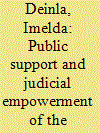

|
|
|
|
|
| Publication |
2014.
|
| Summary/Abstract |
Courts have become an increasing focus for political contestation in Southeast Asia. Yet little is known about the basis of their political power and legitimacy. Drawing on recent scholarship in the field of judicial politics, and presenting a case study of the Philippine Supreme Court after the transition to democracy in 1986, this article explores the conditions under which the Court has exercised its powers in the context of a democratizing state such as the Philippines. More specifically, it will show how strong public support has enabled the Court to exercise its judicial review powers and its authority over contending political actors. In drawing attention to the understudied link between public support and judicial assertiveness, the paper aims to advance existing scholarship by going beyond existing indicators of judicial independence and to provide new insights into the dynamics of evolving constitutional practice in the region through the interaction of the courts with the public.
|
|
|
|
|
|
|
|
|
|
|
|
|
|
|
|
| 16 |
ID:
132745
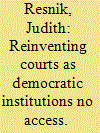

|
|
|
|
|
| Publication |
2014.
|
| Summary/Abstract |
Eighteenth-century constitutional commitments guaranteeing rights-to-remedies were shaped when members of the propertied classes were the prototypical litigants and governments' criminal justice systems were nascent. Twentieth-century egalitarian norms expanded the imagination of what justice could produce, and courts turned into sites of democracy. The particular and peculiar practices of adjudication produce, redistribute, and curb power among disputants who disagree in public about the import of legal rights. But new procedures-alternative dispute resolution (ADR)-encourage, and sometimes require, disputants to mediate or to arbitrate disputes privately as a predicate to or in lieu of using the public forum of courts. Some initiatives delegate adjudication to administrative tribunals, and others outsource binding decision-making to private providers. The resulting fragmentation and privatization of adjudication have profound implications for the newly minted democratic character of courts. The durability of courts as active and disciplined sites of public exchange ought not to be taken for granted. Like other venerable institutions of the eighteenth century-such as the postal service and the press, which served in parallel fashion to disseminate information and support democratic competency-courts are vulnerable.
|
|
|
|
|
|
|
|
|
|
|
|
|
|
|
|
| 17 |
ID:
154550


|
|
|
|
|
| Summary/Abstract |
This paper argues that constitutions can play an important role in fostering a degree of political co-operation if they are useful to the political strategies of both rulers and ruled. Viewing Pakistan's constitutional documents as ‘strategic constitutions’ helps to explain the timing and content of constitutional reform, but also the seemingly contradictory provisions relating to the Constitutions’ commitment to Islam. A strategic constitution functions to settle political exigencies rather than committing itself to the task of putting fundamental issues of state to rest. Often, the constitutional domain substitutes for other conventional channels of politics which may be inaccessible, or deliberately sidestepped, in order to achieve particular political goals.
|
|
|
|
|
|
|
|
|
|
|
|
|
|
|
|
| 18 |
ID:
024775


|
|
|
|
|
| Publication |
DelhI, Vikas Publications, 1970.
|
| Description |
xi, 495p.
|
|
|
|
|
|
|
|
|
|
|
|
Copies: C:1/I:0,R:0,Q:0
Circulation
| Accession# | Call# | Current Location | Status | Policy | Location |
| 004696 | 342/PAT 004696 | Main | On Shelf | General | |
|
|
|
|
| 19 |
ID:
040048
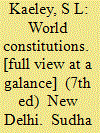

|
|
|
|
|
| Edition |
7th ed
|
| Publication |
New Delhi, Sudha publications, 1967.
|
|
|
|
|
|
|
|
|
|
|
|
Copies: C:1/I:0,R:0,Q:0
Circulation
| Accession# | Call# | Current Location | Status | Policy | Location |
| 000563 | 342.03/KAE 000563 | Main | On Shelf | General | |
|
|
|
|
|
|
|
|
|